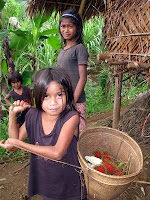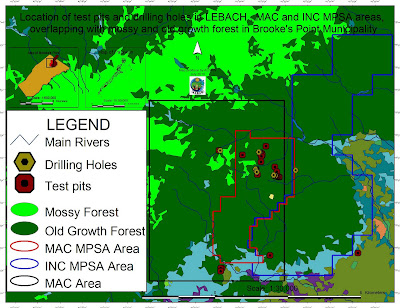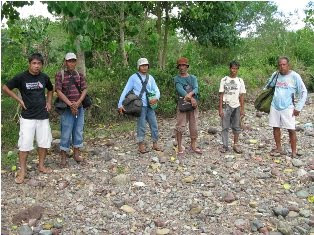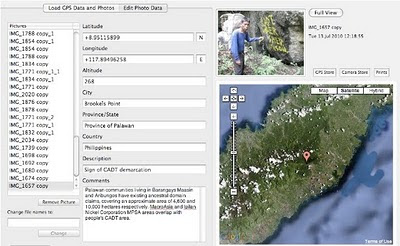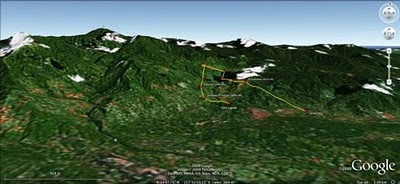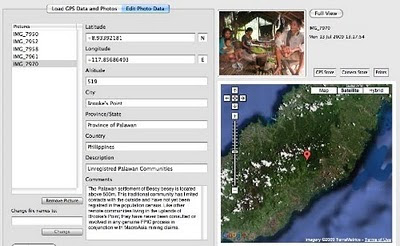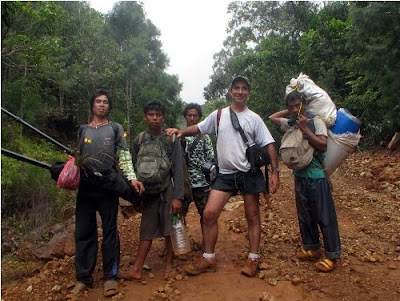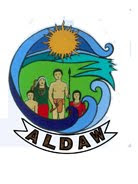ALDAW - September 15 - An update by the ALDAW Network (Ancestral Land Domain Watch)
Despite a growing outpour of international support and solidarity, there is no end to the attempts of the Philippines’ Department of Environment and Natural Resources (DENR) to transform Palawan (a UNESCO Man and Biosphere Reserve) into one of the most popular mining destinations. Only this week, MacroAsia Multi-Billion Giant (
MAC)] through the pages of the ‘
Philippine Star’has announced to have received an Environmental Clearance Certificate (ECC) from DENR to carry ou
t mining operations over a total land area of about 1,114 hectares, in the Municipality of Brookes’ Point (see ). This will lead to the devastation of one of the last and best conserved forests in the Philippines, which
treasures high-biodiversity and is also the home of vulnerable indigenous communities.
According to Artiso Mandawa (ALDAW chairman) “ECC endorsement to MacroAsia by DENR clearly shows that National decisions are violating and bypassing the legal procedures underlying the endorsement of mining permits. In Palawan the law requires mining companies to secure first a clearance from the Palawan Council for Sustainable Development (PCSD) before applying for a ECC and – as of now - MacroAsia has failed to do so”.
PCSD (/) is a local government body in charge of implementing the Strategic Environmental Plan (
SEP law) for the protection and sustainable management of the Province.

Surprisingly, only less than two months ago, the indigenous peoples of Palawan and the local NGOs had succeeded in obtaining from the Palawan Council for Sustainable Development (PCSD) a deferment of a SEP endorsement to MAC. On a PCSD meeting held on July 30, GPS evidences presented by the ALDAW network (Ancestral Land Domain Watch) and by its international partner (the Centre for Biocultural Diversity (CBCD) – University of Kent) had clearly demonstrated that MAC mining interests are concentrated in areas of high biodiversity, in primary forest and up and above to 1,000m ASL. Due to the evidences jointly brought forwards by ALDAW and CBCD, it was decided to defer the decision to endorse a SEP clearance to MacroAsia until a multipartite team composed of PCSD technical staff, local government officials, NGOs and Indigenous Peoples’ representatives would have visited the proposed area to investigate ALDAW findings and the complains raised by the NGO community (see
here and
here). Sadly this official decision is now being circumvented by the actions of DENR.

According to the ‘Philippine Star’ article, the ECC has been released to MacroAsia after a thorough project review and a series of consultations conducted principally under the supervision of the Environmental Management Bureau. “Government authorities are lying, we indigenous communities have rejected mining ever since and even during recent public consultations” says Panglima Sagad, a local elder and traditional Palawan leader. In reality, in February 2009, a petition complaining about the lack of consultation with regard to the passage of the 2007 local government resolution endorsing mining in Brooke’s Point, was signed by both farmers and indigenous peoples. Moreover, peoples demonstrations and a rally carried out in Brookes’ Point on August 27, 2009 convinced the former Mayor to call for additional public consultations to determine the degree of public oppositions to mining activities. The result of these consultations carried out on October 27 and 28, 2009, and the final counting of the votes obtained during these events, indicate that the majority of population in barangays Ipilan and Maasin are united against, and solidly opposing mining. On March 13, the Department of Environment and Natural Resources (DENR) together with MAC and Ipilan Nickel Corporation (INC) set up a public consultation in barangay Mambalot (Brooke’s Point). Interviews to community people attending the consultation, as well as the testimony of Mrs. Erlinda Edep, Barangay Captain of Mambalot, indicate that participants were paid an amount of 200.00 pesos for attending the consultation, and that this inducement was agreed by the mining companies. In spite of MAC and INC attempts to manipulate and control the whole process, the overwhelming majority of peoples attending the public consultation, still expressed their clear opposition against mining operations. Grass-root opposition to mining in Brookes’ Point has also been manifested in the course of numerous street protests culminating in the so called ‘
Karaban’ rally at the Provincial Capitol on June 8, 2010
The recent article on the ‘Philippine Star’ further emphasizes that “in 2008, the Supreme Court has ruled with finality that MacroAsia has vested and legal rights to its MPSA”. However, according to Atty. Gerthie Mayo Anda of ELAC (Environmental Legal Assistant Center) “the vested argument is skewed and cannot be sustained. It is well-settled in Philippine jurisprudence that exploration, development and utilization of natural resources through licenses, concessions or leases are mere grants or privileges by the State; and being so, they may be revoked, rescinded, altered or modified when public interest so requires”. Says Atty. Mary Jean Feliciano of ALDAW “public interest in this particular case refers not only to vulnerable indigenous communities but also to thousands of migrant farmers and fishermen which have contributed to the prosperity and sustainable development of Brooke’s Point Municipality, and whose basic rights are now being trampled down”.
Ironically enough the DENR, through the issuance of an ECC to MacroAsia, is not only bypassing legal procedures, but it is also infringing the
Philippine Mining Act which prohibits mining in old growth or virgin forest, proclaimed watershed forest reserves, wilderness area, and other areas of outstanding environmental value. The DENR is also neglecting those international obligations to which the Philippine Government is obliged. “Palawan, in fact, is a UNESCO Man and Biosphere Reserve but the national government is violating the condition for which such prestigious award was granted. Not only MacroAsia operations, but also those of other mining companies in Palawan are contravening the provisions contained in well-know conventions ratified by the Philippine Government: the Convention on Biological Diversity (CBD)], the UN Declaration on the Rights of Indigenous Peoples, etc.” says Dr. Novellino, UKC/CBCD researcher.
Allegedly MacroAsia, according to the Philippine Mineral Reporting Code, has now completed a seven-phased exploration program over 535.5 hectares or 48 percent of the MPSA’s total. The results indicate a total resource tonnage of around 88.36 million dry metric tons of ore. This is likely to translate into a foreseeable export of one million tons of nickel per year either to China, Japan or Australia. “One of our objectives” says ALDAW Chairman Artiso Mandawa “is to inform the public opinion on the tragedy that MacroAsia open-pith nickel extraction will cause to our indigenous peoples, farmers and our precious forest. We hope that this will encourage potential partners not to invest in MacroAsia stocks”
The irony of Palawan is to have one of the best environmental laws in the country (the Strategic Environmental Plan), but the law itself is continuously being amended to favor large corporations. As a result, both Indigenous organizations and Palawan NGOs are now requesting the PCSD to stop any attempt of changing the definition of ‘core zones’ and other zones to allow mining activities in forested land. “It has already been established that some definitions such as those of ‘controlled use zones’ found in the Strategic Environmental Plan have been amended by the Council to please extractive industries” says Dr. Novellino. He also added “for instance, according to the SEP law, in Controlled Use Area – (the outer protective barrier that encircles the core and restricted use areas): ‘strictly controlled mining and logging, which is not for profit…may be allowed’. Recently the ‘not for profit’ specification has been eliminated, thus opening these zones to commercial extractive activities”.
Aside from MacroAsia, other mining companies are posing equally serious threats to the people of Brookes’ Point, in particular the Ipilan Nickel Corporation (INC) and the Lebach. The latter has been given both SEP clearance by the PCSD and ECC by DENR over a total area of 5,839 hectares and, again, without the consent of the local communities. The local inhabitants are now questioning the authenticity of the so called Certificates of Precondition issued by the National Commission on Indigenous Peoples (NCIP), in favor of Lebach, respectively on October 5 and November 4 2005. On July 24, 2009, NCIP confirmed the issuances of such certificates, claiming that the company’s concession does not overlap with the indigenous ancestral domain. This claim, of course, has been contradicted by both indigenous peoples and farmers who have now decided to filing criminal and administrative cases against PCSD, DENR and NCIP. Even more worrying is the fact that large tracts of Lebach concession include cultivated land, as well as the farmers’ and indigenous peoples’ settlements. According to recent field information, the Lebach company is now harassing and intimidating local farmers by cutting their coconut palms. The final objective is to force peasants out of their land.
As usual, mining companies operations are being justified in the name economic development. However, a recent study by Alyansa Tigil Mina (
ATM) - an alliance of mining-affected communities and their support groups – have recently demonstrated that mining industry in the Philippines has failed to keep its promises of investments, employment and tax revenues. Jaybee Garganera, ATM National Coordinator reported, “The government barely achieved its targets and we have evidence to show this. For instance, the government had targeted at least $6 billion or Php 288 billion worth of investments for priority large-scale projects, but as September 2009, only $2.1 billion or Php 100.8 billion (35%) of its actual target came in as investments. He also added that from a target of Php 336 billion pesos as tax revenue, only Php 26 billion pesos was collected, or merely 8%”. He also noted that there were discrepancies on government records about the jobs generated by the mining industry. The Department of Labor and Employment (DOLE) reported 158,00 jobs (including quarrying), while another Philippine official report pegged that number at only 13,462. “Granting that 158,000 jobs were created in 2008 that is only 66% of the promised jobs” said Garganera
In spite of all this, mining pressure on the Philippine Last Frontier is escalating, with DENR fast-tracking mining contracts at an alarming speed. For both indigenous organizations and NGOs, having to deal with the widespread corruption, and with the multitude of new and emerging mining companies, has become a very strenuous, uncertain and overwhelming task. “For this reason” says ALDAW Chairman Artiso Mandawa “we are now looking for a long-lasting and stable solution to this problem. Hence we are appealing to the newly elected president Noynoy Aquino to scrap the mining act and declare Palawan a mining-free province. The President has the power to reverse those policies that have brought much suffering to our people and to our precious environment".
What you can do
Sign a
Petition to Stop Mining in Palawan!
And address your concerns to:
*Paje, Ramon J.P. DENR SECRETARY
osec@denr.gov.ph
*DENR Head Executive Assistant
hea@denr.gov.ph
* The Director of MINES AND GEOSCIENCE BUREAU (MGB)
mines_r4@yahoo.com
tenement.mgb.gov.ph@gmail.com
tenement@mgb.gov.ph
*MacroAsia Corporation
info@macroasiacorp.com
*PALAWAN COUNCIL FOR SUSTAINABLE DEVELOPMENT (PCSD)
oed@pcsd.ph. AND c/o Mearl Hilario
mearlhilario@yahoo.com
FAX: 0063 (048) 434-4234
*Honorable Governor of Palawan
Baham Mitra
abmitra2001@yahoo.com FAX: 0063 (048) 433-2948
For more information watch ALDAW videos
http://www.vimeo.com/aldawnetwork
http://www.youtube.com/user/ALDAWpalawan
http://hub.witness.org/en/users/aldaw-network
or contact the ALDAW Network (Ancestral Land/Domain Watch)
aldawnetwork@gmail.com
Source: ALDAW Network
















